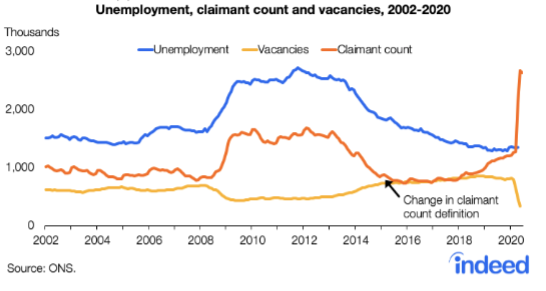Coronavirus: Competition grows for low-paid jobs as lay-offs mount

Competition has grown for low-paid jobs in Britain in recent weeks, amid a wave of mass job losses and furloughed workers’ “diminishing prospects” of returning to previous roles.
Figures from jobs site Indeed show job-hunting has increased most among applicants with a background in lower-paid work in recent weeks, despite low-paid and average-paid vacancies drying up most during the coronavirus crisis.
The drop in lower- and middle-income roles available was still steeper in July than for higher-paid roles compared with a year earlier, despite lockdown restrictions easing.
A new report by Indeed says the decline in job postings has been “broad-based,” with no sector escaping. But it echoes other studies in showing job postings have fallen most in hardest-hit sectors like hospitality, tourism, restaurants and personal services, down as low as 10% of 2019 levels.
Food preparation and services vacancies were down 5.1% and sales vacancies down 2.2%, highlighting the economy’s continued troubles despite curbs on retail and hospitality lifting. Dixons Carphone and Pizza Express became the latest firms to announce heavy job losses this week.
READ MORE: 1,100 jobs at risk at Pizza Express as 67 restaurants could close
Meanwhile competition has grown fiercer for the roles still available in hard-hit sectors, with the biggest increases in applicant interest per job in hospitality, tourism, food preparation and services and customer service. Construction, driving, media and communications, marketing, and production and manufacturing have also seen big jumps in applications.
People with few qualifications and students seeking part-time roles face a particular challenging finding work, according to economists at the listings site.

“Many people won’t be able to quickly go back to the work they were doing before the pandemic. For these jobseekers, the environment is tough because the number of available positions is very low compared with the number of those who need a job,” said Jack Kennedy, Indeed’s UK economist.
But the disappearance of many roles has come alongside a rapid transformation in the nature of vacancies. Indeed analysis of job titles shows almost one in four jobs available in June was different to roles available a year earlier, the highest year-on-year change in the past four years. There are rising vacancies in care, nursing, and social work.
The crisis has increased the mismatch between jobseekers’ skillsets and roles available. The authors say vacancies “simply aren’t sufficient to absorb all the slack” as unemployment grows, but encourage jobseekers to boost their chances by focusing on transferable skills, new skills or looking for remote opportunities.
READ MORE: Average London wages now worth 5% less than in 2007
There are clear signs jobseekers are already starting to adapt to a jobs market that has turned “completely on its head,” however. The number of searches on Indeed that specify a location but leave the role blank have increased five percentage points year-on-year to 28%.
READ MORE: Calls for four-day week ‘ignore reality’ many low earners want more hours
Competition is expected to keep growing for work this year, however. A string of well-known British firms have announced tens of thousands of job losses in recent months, with a weak recovery and winding down of government furlough and other support expected to push up unemployment.
“With vacancies down, benefit claimants up and a slew of companies announcing redundancies, the UK is on the verge of an unemployment crisis,” the report said.


